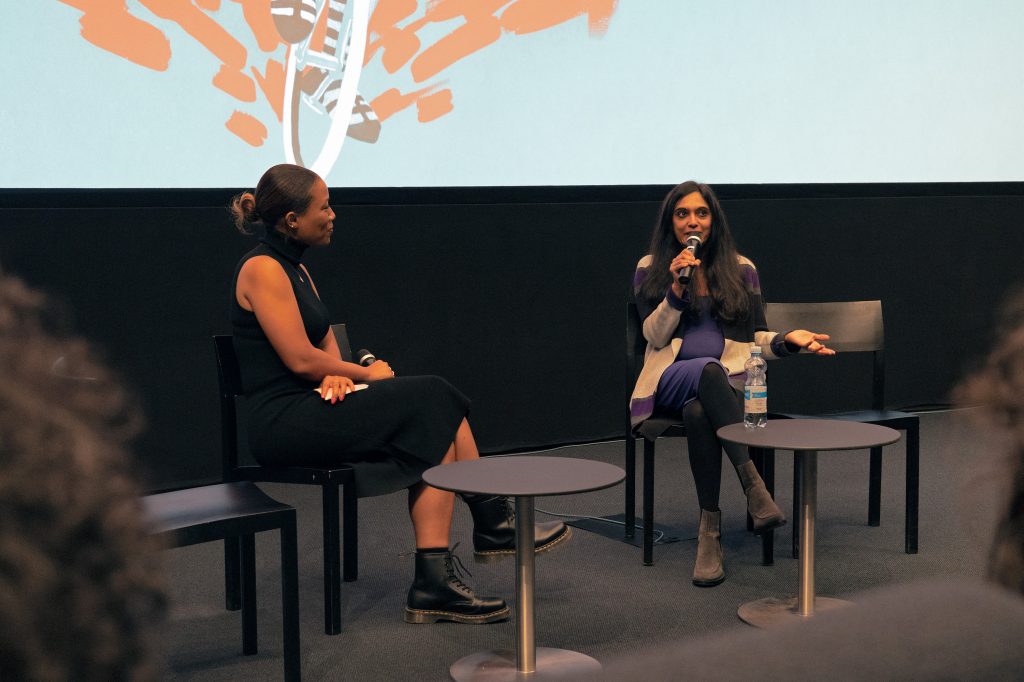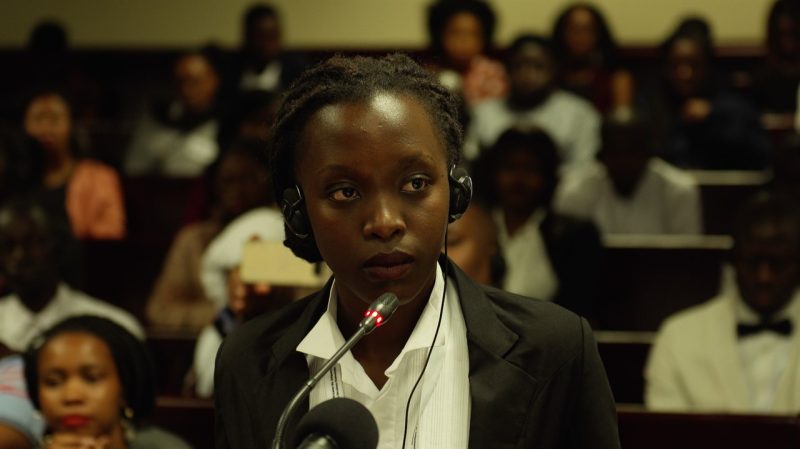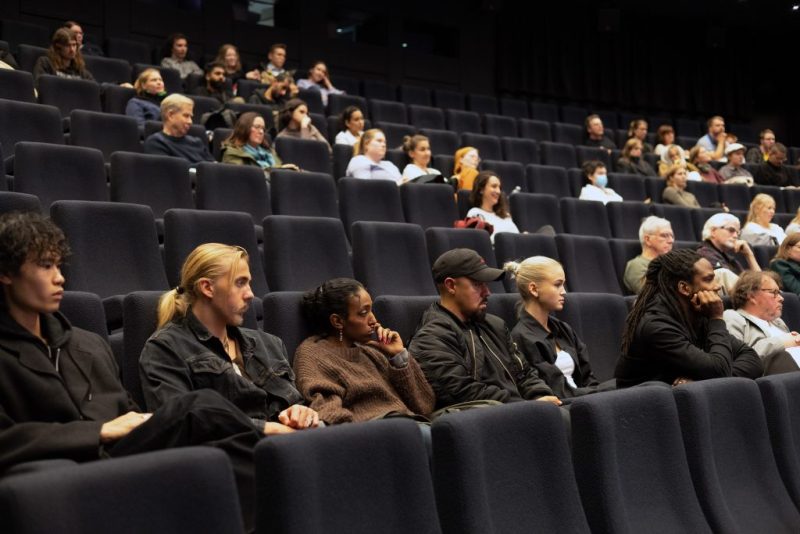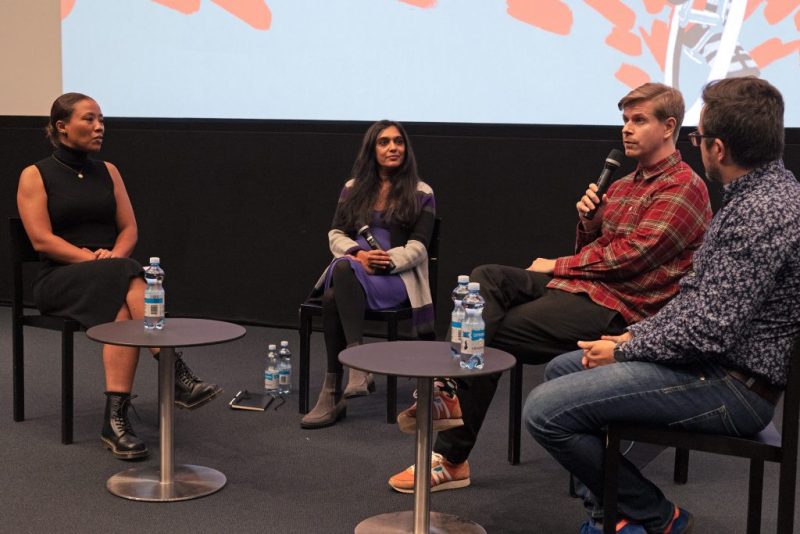A Bloodline of Activism – Shameela Seedat and her documentary film African Moot

Shameela Seedat, the director of the South African-Finnish co-production African Moot, visited Helsinki during the Love & Anarchy festival in September. Academy of Moving People & Images and Art School Maa hosted a TransBorder Conversation with her during the visit. Finnish Film Foundation has supported both the film and the TransBorder Conversations project.
Text: Sharron Todd
Photo: Maria Rannanheimo
“Growing up, I was particularly inspired by family members who’d actively joined the political struggle and were engaged in some form of resistance to the system of racial inequality in our country at the time. Siblings of both my father and mother had been imprisoned, banned, or tortured by the Apartheid government,” says filmmaker, Shameela Seedat, about a long dark period in South African history that only formerly ended in the 1990s. “In some ways, this has inspired my filmmaking in contemporary times, as I am drawn to characters who are ready to speak and ready to act, while all showing their human vulnerabilities.”1
Apartheid translates to “apartness” or “separateness” in the language of Afrikaans. It was a system of legislation that upheld segregationist policies against non-white citizens in South Africa, a group that represents the majority of the country. This legislation was constructed by an all-white government and any resistance to it was met with inhumane physical and psychological treatment by authorities, sometimes ending in death.
Across the pond in the early 1950s, as the U.S. began a shift toward ending the nearly identical policies against black Americans, known as the Jim Crow Laws, Apartheid was just beginning. Under this divisive and oppressive legislation, non-white citizens were immediately forced to live separately from their white counterparts and were also forced to use separate public facilities. Interracial marriage was made illegal. Citizens were assigned hierarchical identities attached to their race, with the darkest among them positioned as the most disadvantaged.
As a teenager, Shameela found it difficult to not have a political mindset. She was surrounded by people who sought out compassion in law and fought for the equal treatment of the disenfranchised. She joined some of the mass protest activities in the 1980s.
“When I was about 10 years old, my parents took me to see a play in my neighborhood about Steve Biko – a black consciousness intellectual and anti-Apartheid activist, who had been brutally killed in police detention at the young age of 29. This struck a very deep chord in me,” she explains.
This type of conviction runs deep in her family. Her aunts and uncles were known activists, with one such aunt being Fatima Meer, one of the most prominent women political leaders in South African history. Despite repeated imprisonment and assassination attempts on both her and her husband’s lives, Fatima refused to be silenced. Among a long history of notable contributions to fighting racial and social inequalities in South Africa, she aligned herself with the Black Consciousness Movement in the 1970s (which was led by Steve Biko) and also co-founded the Black Women’s Federation with Winnie Mandela. She also wrote the first authorized biography of Nelson Mandela, Higher Than Hope (1988).
The Population Registration Act of 1950 provided an underpinning for Apartheid legislation by classifying South Africans by their race: Bantu (black Africans), colored (mixed race), and white. A fourth category was later added to classify Indians and Pakistanis. Shameela’s grandparents immigrated to South Africa in the 1880s from India and her grandfather later started a small newspaper for people of Indian descent living on the east coast of Africa. During her childhood, she was forced to live in neighborhoods and attend schools restricted to only Indians.

African Moot
When asked how she identified under these conditions, she replied, “When I was younger, I did not want to engage with my Indian heritage too much, but rather opted to assert a ‘black’ identity in solidarity with all oppressed people in South Africa, and also to present a united force against white domination. This was not unusual for many people in my generation of Indian descent, mainly because a cornerstone of Apartheid was to rigidly and brutally fix racial and ethnic identities onto us, and then to place oppressed people in hierarchies in a typical ‘divide and rule’ strategy.”
Colorism was not only a byproduct of this legislation, but it was the backbone of its founding. Shameela came from a middle-class Indian family that experienced racial hardships and political backfire from the Apartheid regime, but the experiences of black Africans were significantly cruel and inequitable in comparison. Shameela says, “I must point out that we were ultimately so much better off than many black people in our country who during Apartheid, lost lives, homes, and also basic educational opportunities that made it incapable of entering into the mainstream of our society.”
One of the objectives of this systemic strategy was to create division among non-white citizens by weaponizing race and color while attaching hierarchy to both. However, this attempt to divide only produced the opposite effect on Shameela and her family as it became one of their major sources of motivation to actively dismantle Apartheid ideologies and systems.
Combining a passion for law and filmmaking
It is not surprising that a lineage of human rights advocacy, and more poignantly, an almost inherited compassion for the human condition, is reflected in the films Shameela makes. Her first feature-length documentary, Whispering Truth to Power, follows South African anti-corruption pioneer Thuli Madonsela as she tackles political giants in pursuit of justice and social equity.
Shameela’s latest film is African Moot, a feature documentary that was co-produced in South Africa and Finland. The film premiered in May 2022 and has been making its way through the film festival circuit- winning Best African Documentary at the Zimbabwe International Film Festival and recently nominated for Best Documentary at the African Movie Academy Awards (October 2022). Much like her first film, African Moot is centered around human rights laws and the stories of those who endeavor to eradicate long-endured social and political injustices.
Before becoming a filmmaker, Shameela spent many years as a human rights lawyer. She studied law at the University of Cape Town and earned her master’s degree in constitutional law at Columbia University in New York City. She worked in law research advocacy roles at the constitutional court of South Africa, UNIFEM in New York, and a Cape Town-based democracy think tank, IDASA. After more than 12 years, Shameela decided to pursue a passion that had laid dormant for quite some time. Buried underneath legal paperwork and years of activism was a love for storytelling.
“I always knew I wanted to make films. I was just waiting for the story that meant something to me and that I could throw myself into for long periods of time,” she says. “When Apartheid ended and South Africa’s democratic era began, it seemed logical for me to study and work in law – but over time I realized that it was really in documentary filmmaking where my big passion really lies. Hence, law-themed documentaries!”

African Moot’s Screening in Kino Regina during Love & Anarchy. Photo: Maria Rannanheimo.
Shameela’s background in law created a symbiotic pairing with her filmmaking. She was able to develop meaningful relationships with the characters in her film African Moot as she could empathize with them as law students. The term “moot” is defined as a simulated court case. Moot competitions have been held in different capital cities across Africa every year since 1992 and boast the largest pan-African gathering of law students and human rights practitioners on the continent. Top law students must first compete against each other within their universities. Then only the winners are selected to represent their schools and countries at the prestigious African Human Rights Moot Competition. In this film, the competition is being held in Gaborone, Botswana, and students are challenged with confronting this year’s complex subject: “The Right of Refugees on the Continent.”
The film follows teams from Kenya, Egypt, Uganda, and South Africa. These young aspiring lawyers diligently prepare to act as both prosecution and defense in fictional human rights cases. Each student is determined to win and bring the coveted trophy home. There is a cadence of tension throughout the film as we’re given a glimpse into the brilliant minds of those who are committed to shaping the future of Africa. We see them through moments of frustration and triumph as they navigate through mammoth tasks and legal texts hoping to strengthen their arguments. As we watch students wrestle with the complexities of migration facing their own countries, we also witness a story of friendship, conflict, hope, and self-evolution.
The film also follows some students on their intimate journeys of acceptance and identity in a still-conservative-leaning African culture. Edward is the gay son of Ugandan refugees, and he struggles to find his footing in a space where he is not fully welcomed. He carries this burden as he competes in the same trenches as other students at the moot. Edward’s story and those of other students are woven into the film’s larger commentary on refugee rights. These moments throughout the film give us welcomed visibility into the personal struggles and wins of the characters.
Though African Moot is centered around a high-stakes law competition, it is a human story that captures the vulnerability and strengths of a young African generation. Now more than ever, it is critical that we hear the voices of this particular group as they will control the future trajectory of Africa’s internal progress and its global positioning. As the world quickly evolves into a technology-driven ecosystem faced with sociopolitical complexities that are largely foreign to older generations, impactful change will rely on the unique perspectives and experiences of emerging generations such as the characters in this film.
Co-producing with Finland
African Moot was one of 25 films that were selected for the Generation Africa project. This pan-African project was created by STEPS, a South African non-profit media company that connects filmmakers, producers, broadcasters, and funders that are all driven by social change through documentary film. Generation Africa is the fourth collection of films produced by STEPS and focuses on migration through the lens of African youth and their lived experiences.
Among the 180 submitted films, African Moot was selected and Shameela and her team were connected to an international community of filmmakers, co-producers, and broadcasters. As a result, she and her partner at Undercurrent Films and Television, Francois Verster, were connected to Juha Löppönen from Finland-based Tuffi Films, and shortly after, they forged a co-production relationship. They garnered support from the Finnish Film Foundation and AVEK (The Promotion Centre for Audiovisual Culture), which played a pivotal role in both funding and sourcing Finnish co-production talent and opportunities.
She says, “We had a very positive experience working with Tuffi Films in Finland, who came on board once we had a rough cut. Juha Löppönen was our primary producer and was always very respectful of our vision and creative ideas for the film. Through the co-production, we worked with an incredible team of Finnish creatives including editor Okku Nuutilainen and sound designer, Tuomas Skopa, and others who helped to shape the final film in very significant ways.”

Sharron Todd, Shameela Seedat, Juha Löppönen, Erkko Lyytinen. Photo: Maria Rannanheimo.
In September 2022, Shameela was reunited with her Finnish collaborators at the Helsinki International Film Festival – Love & Anarchy (HIFF) where African Moot was being shown. Following the film screening, Shameela participated in a TransBorder Conversations2 panel discussion hosted by HIFF, the Academy of Moving People & Images (AMPI), and Art School Maa about co-production and distribution matters in the context of the Generation Africa project. She was joined by Juha Löppönen from Tuffi Films and Erkko Lyytinen from the Finnish broadcasting company, Yle. They discussed the co-production process, the future of film, and the impact of diverse storytelling across broader audiences.
In recent years, there have been ongoing conversations in Finland about a lack of diverse stories in film and media. Yet a growing portion of the Finnish population is of BIPOC (Black, Indigenous, and people of color) descent and other non-white groups. As such, there has been an active social push from advocates and artists alike for fair representation and inclusion of diverse experiences across all media platforms. Though far from the finish line, progress has been made in this space with active participation from not only the Finnish arts and film community and local BIPOC organizations but key decision-makers in the media.
Yle broadcasting company is one such example as they teamed up with STEPS on the Generation Africa project in a 4-film commitment deal to broaden the reach for African filmmakers and their stories. African Moot is one of the films being distributed by Yle through this collaboration and can be viewed on Yle Areena.
After premiering at the Hot Docs International Film Festival in May, African Moot has been screened at DOK.fest München, Sydney Film Festival, Black Filmmakers Film Festival, and many others. Despite the recognition, Shameela remains humble about her work. She says, “While I don’t feel that I myself am advancing human rights as such – in my filmmaking, I am definitely drawn to people who are passionate about a cause, and who confront the often messy and contradictory worlds in which we all operate.” She hopes that people will watch her film and not only gain perspectives on pressing political issues but into the vulnerable traits that make humans human.
Shameela discusses future projects and a desire to create a film that is personal to her, one that is about her aunt, Fatima Meer. “Fatima always spoke out fearlessly right up until her last days. Her ’growing up’ story is a fascinating one in itself, and I believe that her work and ideas continue to cast light on current predicaments. It would be a film made in collaboration with her daughters, who obviously have unique insights.” With a hint of pride in her voice, she says, “Fatima Meer was a writer, artist, sociologist, filmmaker, and prominent activist – but also a formidable matriarch, playing a distinct role in the world of our family.”
Shameela’s compassion and contributions to social change are undoubtedly influenced by a rich family history of human rights advocacy. Through activism and the arts, Shameela and her family have brought to light racial inequities plaguing South Africans and have fought for the rights of the underserved while leveraging their resources for those without. Most would agree that they are the best examples of a global citizen, one that endeavors to improve the communities they live in and the world around them. As author and activist James Baldwin once stated, “the precise role of the artist, then, is to illuminate that darkness, blaze roads through that vast forest, so that we will not, in all our doing, lose sight of its purpose, which is, after all, to make the world a more human dwelling place.” 3
References:
- In-person, Zoom, and email conversations between Shameela Seedat and Sharron Todd between September and October 2022.
- From Transborder Conversations panel discussion organized by AMPI & Maa & HIFF, moderated by writer and filmmaker Sharron Todd with filmmaker Shameela Seedat, producer Juho Löppönen, and commissioner Erkko Lyytinen as panelists (HIFF, Kino Regina, September 19, 2022).
- Baldwin, James, short essay The Creative Process (Creative America, Ridge Press, 1962)
Sharron Todd is an African-Asian American writer, filmmaker, entrepreneur, and currently a marketing executive.
The article is published in cooperation with Moving People & Images Journal.

